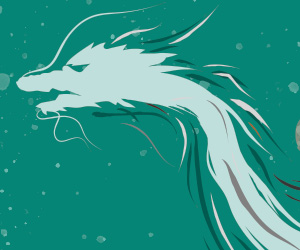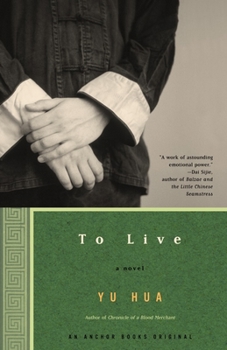To Live
Select Format
Select Condition 
Book Overview
Originally banned in China but later named one of that nation's most influential books, a searing novel that portrays one man's transformation from the spoiled son of a landlord to a kindhearted peasant. "A work of astounding emotional power." --Dai Sijie, author of Balzac and the Little Chinese Seamstress From the author of Brothers and China in Ten Words this celebrated contemporary classic of Chinese literature was also adapted for film by Zhang Yimou. After squandering his family's fortune in gambling dens and brothels, the young, deeply penitent Fugui settles down to do the honest work of a farmer. Forced by the Nationalist Army to leave behind his family, he witnesses the horrors and privations of the Civil War, only to return years later to face a string of hardships brought on by the ravages of the Cultural Revolution. Left with an ox as the companion of his final years, Fugui stands as a model of gritty authenticity, buoyed by his appreciation for life in this narrative of humbling power.
Format:Paperback
Language:English
ISBN:1400031869
ISBN13:9781400031863
Release Date:August 2003
Publisher:Vintage
Length:256 Pages
Weight:0.46 lbs.
Dimensions:0.6" x 5.2" x 7.9"
Customer Reviews
6 ratings
Emotionally Heart-Wrenching
Published by Faythe , 5 years ago
I ordered this book because it was chosen for our book club to read & discuss together. When I first began reading it, I thought it might be a humorous book, but then it became so emotionally heart-wrenching that I could not put it down! A short read, but a good read. It will make you think & feel so deeply.
To Live - An Amazing Book
Published by Thriftbooks.com User , 19 years ago
"To Live" is a book that's hard to explain. The writing, at first, seems overly simplistic, but as you read, you find yourself carried along by the narrators unvarnished description of events. "To Live" is a book that will make you cry. I finished it in two days, and afterwards I felt like I was a mute, waiting for everything to sink in. That's the mark of an amazing book. Like all of Yu Hua's books, "To Live" is a story that sticks with you long after you close the covers and put it on your shelf. Be warned though, "To Live" not a book for the faint of heart. This book hits you in the gut. If you don't mind a little literary pain, then "To Live" is more than worth it.
Even Kugen is working hard
Published by Thriftbooks.com User , 19 years ago
Being that I am living and working in China for the next year or so I've decided that I need to become more familiar with the country's history and literature. Now I am not completely clueless when it comes to Chinese history and literature, but, for the most part, the undergraduate and graduate classes that I have taken that pertain to China concern the centuries before the fall of the Chinese dynastical system of government. While I do enjoy reading the literature and studying the history of this vast time period, I feel that I lack knowledge that pertains to modern Chinese. Therefore in recent months I've picked up a number of recent Chinese novels and books pertaining to modern China with hope that I can enrich myself during the next several months. Well, Wei Hui's Shanghai Baby and Chun Sue's Beijing Doll, although they are entertaining and give the reader a glimpse of attractive gold diggers and Beijing's underground punk-rock scene, they do not give the reader a foundation on how recent history, Post-1945, or when the Japanese were defeated and driven from China, has affected modern society. However, in their defense, this was not the goal the authors wanted to obtain. Yet, after I picked up and read Yu Hua's To Live, with the desire to read literature with a more historical aspect in mind, my thirst was quenched. Before I purchased To Live I knew little about its author Yu Hua, but I did know the novel was the basis for Zhang Yimou's movie of the same title. Having been introduced to the novelists Liu Heng, writer of the novella that was the basis of Ju Dou, Su Tong, writer of the novella that was the basis of Raise the Red Lantern, and Mo Yan, writer of the novel that was the basis for Red Sorghum, through Zhang Yimou's films, I believed that I could not go wrong with To Live. I was right. This is a beautiful book. The novel opens with a nameless first-person narrator telling the reader of his old job that consisted of traveling and collecting folksongs and old stories. The villagers were generally happy to see him and were completely willing to relay stories of their past days. Although he enjoyed their stories, the narrator had yet to find a person who could completely recreate his past. However, after he met an old farmer named Fugui who was busy plowing his fields and kindly coaxing his old ox to work, his desire was satiated. In his younger days, like his father before him, Fugui had been the epitome of the prodigal son. Spending his days whoring and gambling, Fugui wasted huge amounts of money. However, it seems that he enjoyed himself, doing such things as riding a fat prostitute piggyback and ordering her to take him around town. His father was of course upset, but having been of a similar bent himself during his younger days, he did not protest too much. In the eyes of Jiazhen, his lovely, but pregnant, wife, his mother, and his little girl, Fengxia he could do no wrong. However, when a professional gambler named Long Er mad
Minature, yet epic in its sweep
Published by Thriftbooks.com User , 19 years ago
"To Live" aptly characterizes this novel from Yu Hua. Fugui, the main protagonist, is subject to a myriad of repressive elements that subjugate his freedom; all he can really do is go on and survive: gambling, drinking, prostitution, WW2, communism, Cultural Revolution all intervene in his life with significant effects. While his life seems miserable, he maintains hope and survives. The novel conflates what it means to survive in a historcal framework in China. To live, implies to suffer through upheaval and poverty that will inevitably instigate tragedy. It is a life lived in the trap that the world has become. The narrative is simple and straightforward. Yu Hua deftly creates character and plots effectively. The only other Chinese novel I have read is Dai Sijie; it had a similar pacing and narrative style. I highly suggest both.
incredible
Published by Thriftbooks.com User , 21 years ago
Read through it in about 2 days. The simple story-telling technique of the author is refreshing and the novel moves along at a fast pace. The details are not sparred, as we get an excellent idea of what Fugui went through in his full and amazing life. I'm going to read "Chronicles of a Blood Merchant" next. Don't miss this one. Really hits home in this material world we all live in.
A book that deserves a worldwide readership
Published by Thriftbooks.com User , 21 years ago
This marvelous and touching novel is a timeless family epic that, while written originally for a Chinese-reading audience, is slowly reaching out around the world to readers in English, French and German. It's a book about life, love, family, dreams, the very stuff of what propels all of us, and Yu Hua's magic touch with words is something to behold. You won't forget this kind of book for a long, long time, once you've finished and the publisher deserves some nice kudos for bringing it out in English, finally. You will see yourself in Fugui and his family, since they are familiar to all of us in their own way, and it just goes to show how it really is a Global Village after all. All in all, a book for the ages, and especially, for now!
To Live Mentions in Our Blog

Read Like a Rat! Or a Tiger, or a Rabbit, or . . .
Published by Ashly Moore Sheldon • January 25, 2024
As we approach the Chinese New Year on February 10, we're making reading recommendations for each of the twelve signs of the Chinese zodiac, an integral part of Chinese culture for more than 2,000 years. Learn more about your sign and the book we chose for you.






